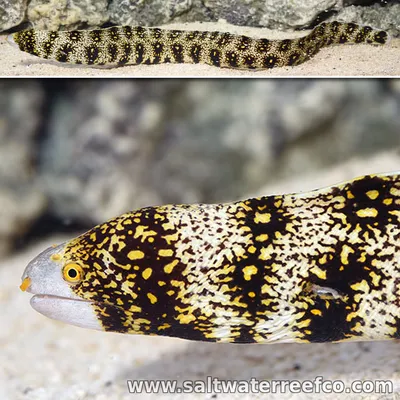At SaltwaterReefCo, we love helping our clients create thriving aquatic environments, and few saltwater inhabitants bring as much intrigue and unique character to a large marine tank as the Eel. These ancient and fascinating fish, such as Moray Eels and Snowflake Eels, are adored by aquarists for their captivating, snake-like bodies, striking patterns, and the air of mystery they bring to a reef.
While they can be a truly rewarding addition to a marine aquarium, eels are not for every tank and have very specific needs that must be met to ensure they flourish. Their predatory nature and secretive behaviors require a stable, well-maintained system with a secure setup. Here's what you need to know about keeping these magnificent creatures:
Tank Requirements
Eels are carnivorous predators that spend most of their time hidden away in rockwork, waiting to ambush their prey. They are highly skilled at finding escape routes, so a secure tank is a must.
Minimum Tank Size: For smaller species like the Snowflake Eel, a minimum of a 75-gallon aquarium is recommended. Larger species like the Moray Eel require a much larger tank (150 gallons or more) to provide adequate space.
Secure Lid: This is a non-negotiable requirement. Eels are notorious escape artists and can fit through incredibly small openings. A heavy, tight-fitting lid with no gaps is essential to prevent them from climbing out.
Aquascaping: Provide ample live rock with plenty of stable caves, crevices, and overhangs. These structures offer vital hiding spots and a sense of security. Ensure the rockwork is stable and secure so it cannot collapse on the eel.
Filtration & Flow: Robust filtration (sump, protein skimmer, refugium) is crucial for maintaining pristine water quality. Eels are messy eaters, and a strong filtration system is needed to handle the bio-load. Moderate water flow is generally appreciated.
Water Parameters
Eels are marine fish and demand stable, high-quality saltwater conditions, typical of a healthy reef tank.
Temperature: Maintain a consistent water temperature between 74-80°F (23-27°C).
pH: A stable pH range of 8.1 to 8.4 is ideal.
Water Changes: Regular partial water changes (10-20% weekly or bi-weekly) are essential for replenishing trace elements and preventing nutrient buildup.
Diet and Feeding
Eels are carnivorous ambush predators that require a diet of meaty foods. Caution must be exercised during feeding to avoid accidental bites.
Varied Diet: Offer a diverse diet of small, meaty foods. Excellent options include:
- Frozen silversides or other small feeder fish
- Frozen shrimp, squid, or krill
- Finely chopped quality seafood (e.g., clam, octopus)
Feeding Frequency: Eels have a slower metabolism than most fish and should not be fed daily. Feeding 2-3 times a week is generally sufficient.
Feeding Method: Always use feeding tongs to offer food. Never feed an eel with your hand, as they have a strong bite and poor eyesight, and may mistake your hand for food.
Tank Mates
Eels are predatory and will eat any fish or invertebrate that can fit into their mouths. Careful consideration must be given to their tank mates.
Good Tank Mates: Other large, semi-aggressive to aggressive fish that are too big to be considered prey. Good options include:
- Large Tangs
- Groupers
- Lionfish (compatible but require caution)
- Large Triggerfish
- Other eels of a compatible species, but only in a very large tank
Avoid:
Invertebrates: Eels will eat crabs, shrimp, and other crustaceans.
Small Fish: Any small fish, regardless of how fast they are.
Overly Aggressive Fish: Fish that may harass the eel while it is in its den.
Common Health Concerns
Maintaining optimal water quality and a consistent feeding schedule is the best defense against disease in Eels. Like all fish, they can be susceptible to common marine ailments:
Stress: Poor water quality, inappropriate tank mates, or a lack of suitable hiding places can lead to stress, making them susceptible to other diseases.
Ich (Cryptocaryon irritans): A common parasitic infection, though their thick slime coat provides some protection.
Injuries: Eels can injure themselves by attempting to escape or getting stuck in equipment if the tank is not properly secured.
Prevention is key! Always quarantine new fish for 4-6 weeks, maintain pristine water conditions, and provide a frequent, nutritious diet. If you notice any signs of illness, prompt diagnosis and treatment are crucial.
At SaltwaterReefCo, we understand the unique and demanding needs of Eels and offer specialized aquarium maintenance services to ensure their health and well-being. From comprehensive water testing and advanced filtration solutions to tailored feeding regimens and secure tank setup recommendations, we're here to support your passion for these spectacular marine predators.
Ready to bring the captivating presence of an eel to your reef, or need expert care for your existing predator tank? Contact us today for a consultation in Highland Park, Illinois, and surrounding communities!
